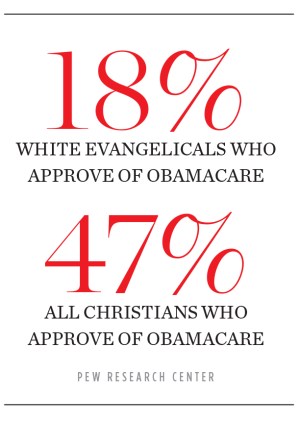Enrollment in Christian alternatives to health insurance tripled under the Affordable Care Act (ACA) enacted by President Barack Obama. The total number of individuals across health care sharing ministries surpassed 625,000 this year.
Christians who swap health insurance premiums to cover each other’s expenses instead usually find themselves with lower payments than they’d have for policies purchased through the ACA exchanges. But as President Donald Trump pledges to dismantle Obamacare—starting with the individual mandate requiring coverage—many health care sharers are committed to staying put.
“With all the talk of health care reform and ‘What do we do? How do we fix this mess?’ the solution will not come from regulations and mandates,” said Anthony Hopp, spokesman for Samaritan Ministries, one of the biggest health care sharing networks. “We’re going to have to think biblically.”
Groups like Samaritan Ministries (whose enrollment jumped from 65,000 to 224,000 individuals over the past five years) and Medi-Share (up from 46,000 to 222,000 during the same period) take their cues from the New Testament call to “bear one another’s burdens.”
“We hear from a lot of church organizations and religious nonprofits,” said Michael Gardner, spokesman for Medi-Share. The booming network, which opened a branch office in Colorado Springs last year, is considering creating group plans that Christian organizations can offer employees. “We want to meet their needs as well.”
These ministries say their principles go back to the early church: selling property and possessions to “[distribute] to anyone who had need” (Acts 4:35). Members of organizations like Samaritan Ministries and Medi-Share match each month’s contributions with thousands of households that have major medical expenses arise.
In the New Testament, “there are lots of signs about this kind of care and awareness; where one body has needs, others in the body are supposed to step up,” said Darrell Bock, a Dallas Theological Seminary professor who has authored commentaries on Luke and Acts.
Compared to contemporary efforts for Christians to pay for each other’s heart surgeries, births, broken bones, and cancer treatments, “I think the sentiment and the approach is actually somewhat parallel,” Bock said. “In Acts, it shows the nature and depth of the community. But it’s not something that’s commanded.”
Like most acts of generosity described in the Bible, providing for needs within the church should be done voluntarily, scholars say.
In Acts 2, the same chapter that chronicles Pentecost, Luke describes sharing within the church body and uses language affiliated with ancient utopias, according to Craig Keener, a biblical studies professor at Asbury Theological Seminary. “Luke sees it as an ideal,” he said. “It follows the outpouring of the Spirit, so he sees it as a good thing.”
Daniel Coughlin said joining a health care sharing network taught him to trust the Christian community. “Samaritan Ministries is more than an inexpensive way to provide for my health care,” said Coughlin, who survived cancer at 25 and whose medical history long prevented him from obtaining insurance. “Health care sharing is being part of a community and bearing the burdens of the other people.”
People have become more willing to opt for a paradigm-shifting alternative as today’s “sharing economy”—led by industry disrupters Uber and Airbnb—reintroduces a largely individualistic culture to the power of the collective.
The Christian health care networks that began as small-scale, relatively unknown operations in the late ’80s and early ’90s now flourish as Americans rethink their relationship with institutions and each other. Health care sharing organizations do not operate as insurance and don’t guarantee coverage. Yet it doesn’t seem as strange to count on the generosity of neighbors now that crowdfunding is on the rise; hundreds of thousands of Americans have turned to online campaigns on sites like YouCaring and GoFundMe in order to cover unexpected medical costs.

While the Enlightenment and Reformation brought Protestants a greater sense of individualism, “the cultures of the Bible were collectivist—group first, individual second,” said Ben Witherington III, another New Testament scholar at Asbury. Believing that God was the owner of all things, the Jerusalem church was “prepared to share as needed,” he said.
For Christians, health care sharing may take the place of insurance in their budget, but functions differently in their lives because of the motivations at its core. The ministries send out prayer requests and match members with specific needs in the network, connecting them personally to wherever their $350 or $500 payment goes that month. The plans only cover unexpected medical expenses, so routine and preventative care costs like mammograms and colonoscopies, long-term prescriptions, mental health, and many other expenses covered by traditional insurance programs must be covered by the patient.
“People will hear about the low cost, and that may be what gets them to pick up their phone and call. But it’s really their faith that motivates them,” said Gardner. His Medi-Share network has covered $1.4 billion in medical bills since it began in 1993.
Many health care sharers sign up to avoid the year-over-year price jumps. Obamacare premiums rose by about 25 percent for 2017, with certain states adopting hikes that amount to $1,000 to $2,000 increases for families who don’t qualify for subsidies, according to Time.
Members of health care sharing ministries (provided the organizations have been functioning since 1999) are exempt from the ACA’s individual mandate, which penalizes Americans without health insurance. Days after Trump took office in January, adviser Kellyanne Conway indicated that the President would not be enforcing the mandate any longer. The eventual end to the individual mandate will do away with the need for a religious exemption.
“Things are definitely in motion, but we anticipated that with Trump,” said Hopp, following Conway’s announcement and the President’s executive order urging agencies to ease ACA requirements. “Health care sharing ministries existed before the ACA; God-willing, they thrived during the ACA; and they will survive after.”
Editor’s note: An earlier version of this print story was published online on February 2.











